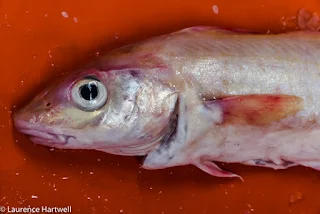The buyers gather round auctioneer Ian for the first auction of Wednesday's market...
with some prime fish like these big tub gurnards...
monk tails...
and a good mix of flats and ray...
including these cracking plaice...
all caught on film...
looks like the beamer William Samson Stevenson was scarping those patches of hard ground or a wreck again judging by the number of conger eels they landed...
along with a dozen boxes...
of the crabbers' go to bait, the lesser spotted dogfish which are abundant around coastal waters of the UK...
just the odd John Dory...
while it will be interesting to see where these urchins end up later today, maybe a taster dish at The Shore restaurant in Penzance...
along with these immaculate squid...
and some tasty looking scad...
plenty of mackerel with the handliners yesterday from St Ives...
while whiting...
a few cod...
and the odd turbot...
more than enough to put a smile on Mr Cripps face...
the sum total of hake on a market with no net fish...
the gaping jaws of tub gurbnard...
and this unusual catch...
a handful of haddock...
and plenty of megrim soles...
the staple diet of the beam trawl fleet...
a brace of JDs..
on a morning devoid of sunshine...
as work on the market roof continues...
to fit solar panels...
in two rows the length of the fish market roof...
down the end of the Mary Williams pier, the ex-Breton trawler..
,Breizh Arvor...
showing off her twin-rig trawl...
spread by Thyborøn doors...
and the heavy combination bridle complete the rig...
and her new paint job...
a huge storm front passes over St Michaels Mount...
and Newlyn.





































































